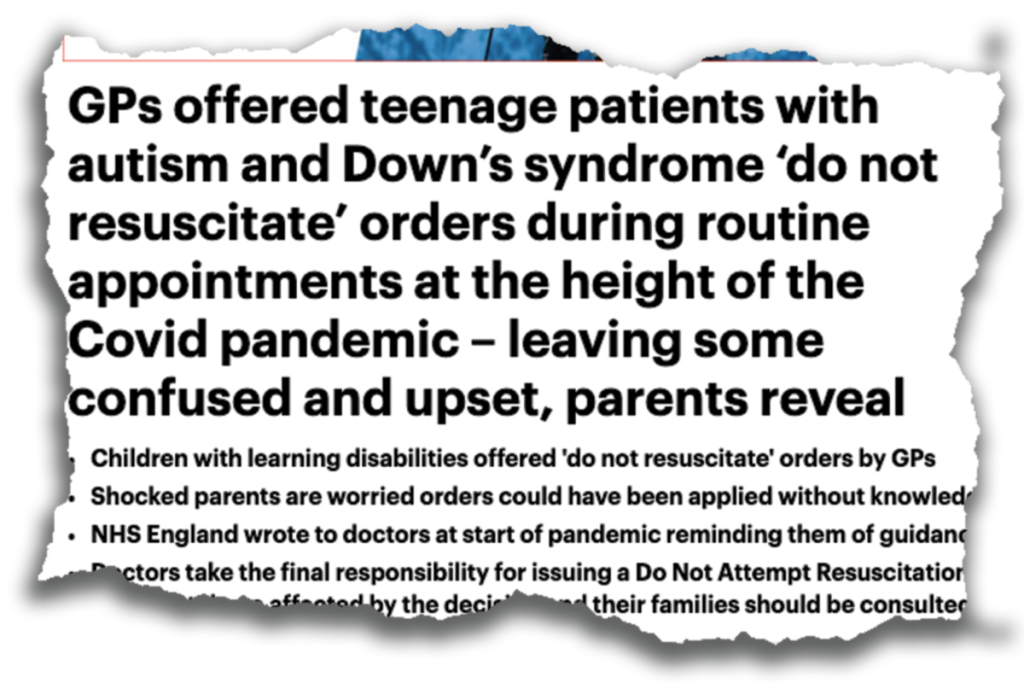
On 27 December 2021, Mail Online published an article on the use of ‘do not resuscitate’ orders for teenage patients with learning disabilities.
It was based on an investigation carried out by The Telegraph, which shared the stories of two parents whose children had been offered a do not attempt CPR (DNACPR) order at an appointment at their GP surgery during the pandemic. The parents said they believed they had only been asked the question because of their child’s learning disability.
It’s an issue that has come under the spotlight during the pandemic, with NHS England reiterating in April 2020 that learning disability and Down syndrome should ‘never be a reason’ for a DNACPR order. A CQC investigation later found patients’ human rights may have been breached 500 times, and confusion and pressure at the start of the pandemic affected advanced care decisions.
But were Mail Online’s portrayal of GPs and its reporting of The Telegraph’s findings accurate? Here we scrutinise the article and the issues it raises.
“GPs offered teenage patients with autism and Down’s syndrome ‘do not resuscitate’ orders during routine appointments at the height of the Covid pandemic – leaving some confused and upset, parents reveal.”
The mention of GPs in Mail Online’s headline suggests GPs have been routinely offering young patients with learning disabilities DNACPR orders. This is misleading. The Telegraph’s investigation features two examples. In one, a GP did ask the question about a DNACPR order. In the other, the question was asked by a healthcare assistant. It also notes: ‘…prior to today’s investigation, the cases which have emerged relate to adults, not children.’
The Telegraph highlighted that the question was asked at GP surgeries, but its article did not focus solely on GPs. Its headline also does not mention general practice.
This is not the first time Mail Online has taken a health story and painted GPs as solely responsible in the headline.
In September, a Mail Online article on a report by the Healthcare Safety Investigation Branch stated a ‘lack of face-to-face GP appointments caused stillbirths to spike 88% in England’ during the pandemic. Mail Online later removed ‘GPs’ from the headline and issued a correction, after GPs pointed out a fundamental error, saying: ‘We are happy to make clear that antenatal check-ups and appointments are generally carried out by midwives and obstetricians.’
“The DNR orders were reportedly offered following ‘concerns about the pressure on the NHS’ – but [they have] left families confused and ‘upset’.”
The Telegraph investigation used in the Mail Online report explained the families were asked about the orders ‘amid concerns about the pressures on the NHS’. But in one of the cases, the CCG also wrote a letter of apology to the family, and posted on social media about the incidents saying that a ‘template’ had been used that ‘unintentionally [gave] GPs the impression that they must record the status as part of the annual health check’. This information is not included in the Mail Online piece.
“NHS England wrote to medics as the pandemic struck reminding them of guidance that learning disability should never be a reason for issuing a DNR.”
This is true. Reports began to surface that DNACPR orders were being used inappropriately at the start of the pandemic. Health professionals were advised to ensure advanced care planning was in place for individuals who might need it, and reminded that blanket DNR policies were never acceptable.
In April 2020, NHS England wrote to trusts and GP practices – referenced here by Mail Online – reiterating that ‘the terms “learning disability” and “Down syndrome” should never be a reason for issuing a DNACPR order or be used to describe the underlying, or only, cause of death…’
“Research last year also found that DNR orders were being placed illegally on the medical files of adults with learning disabilities. MPs responded by ordering an urgent review of the ‘appalling’ practice, calling for it to be brought to an end by Christmas.”
In March 2021, the CQC published its findings on the use of DNACPR orders in the pandemic, after being commissioned by the Department of Health and Social Care. It said that from the beginning of the pandemic, there were concerns that DNACPR decisions were being applied to groups of people, rather than taking into account each person’s individual circumstances’.
It found 6% of 2,048 adult social care providers felt people in their care had been subject to inappropriate ‘blanket’ DNACPR decisions. Meanwhile, 508 DNACPR decisions since 17 March 2020 had not been agreed in discussion with the person, their relative or carer, the report said.
It found that the number of patients with DNACPR orders increased from 28% to 36% during the pandemic. In nursing homes, the figure increased from 74% to 92%.
The regulator looked at how DNACPR decisions were made across ‘all types of health and care sectors’ – including care homes, hospitals and primary care. This included reviewing seven CCGs and how they had worked with other health and social care providers and patient representative bodies as a ‘system’. The final report included examples of both poor and positive practice by GPs. It made recommendations for providers and Integrated Care Systems, as well as for DHSC and NHS England.
















I am not sure how the Telegraph managed to find a GP surgery that was offering ‘routine appointments’ during the height of the pandemic.
Surely most GPs were only able to meet the demand for urgent appoitnments or emergency management?
I doubt that many would have had the time to go through DNAR paperwork with anyone whom they had not been instructed to by NHSE. We were all trying to keep consultation lengths to a minimum to reduce risk of infection to patients.
A GP = all GPs in mainstream media.